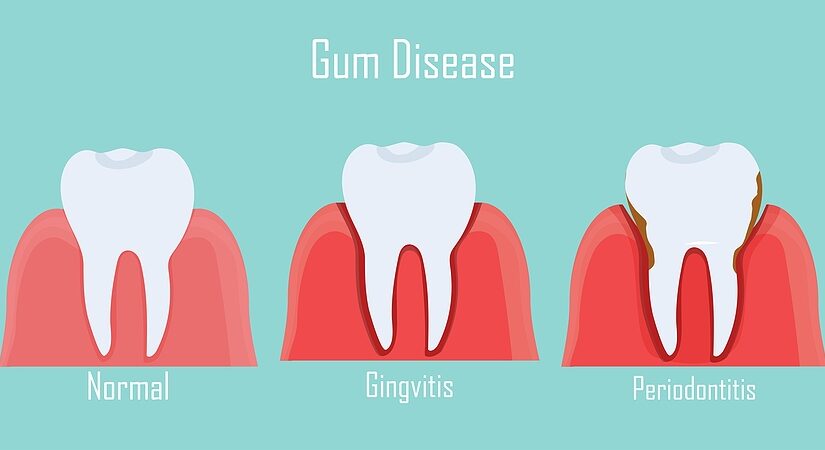By: Dr. Elizabeth Eggert
You’ve heard it time and again: Your Eggert Family Dentistry dentists and hygienists are always urging you to brush and floss for maximum dental health.
Cavities might be the first malady that comes to mind, but preventing cavities is not the only reason to brush and floss faithfully.
Good oral hygiene habits can also prevent gum disease, or even reverse it, in its early stages.
Why is this Important?
A 2018 report by the Journal of Dental Research found that gum disease affects nearly half of all Americans age 30 and over. That means almost 65 million Americans are battling gum disease.
What is Gum Disease?
Let’s clarify what we mean when we say “gum disease.”
Gum disease is the umbrella term which includes gingivitis and periodontitis and is also known as periodontal disease. It is inflammation of gum tissue, caused by bacterial growth around the tooth, often along and under the gum line.
Periodontal Disease presents in four stages:
Stage 1: Gingivitis, indicated by red or inflamed gums that may bleed during brushing.
Stage 2: Early periodontitis, in which the bone supporting the teeth shows slight loss of bone mass. Other symptoms may not be apparent.
Stage 3: Moderate periodontitis, in which bone around the teeth and gum tissue are damaged and teeth may start loosening.
Stage 4: Advanced periodontitis, in which symptoms are more severe, teeth may be very loose and biting and chewing can be painful. At this stage, it may prove to be difficult to save the teeth.
What is Gingivitis?
Gingivitis is the beginning stage of periodontal disease. It starts because plaque develops on the teeth at the gum line. Without proper removal, this plaque will cause gum inflammation. It’s potentially reversible with proper dental hygiene and intervention. A gingivitis diagnosis should be viewed as a warning sign because if left untreated, it will lead to periodontitis.
What is Periodontitis?
Periodontitis is when the bone that supports the tooth starts to dissolve. This chronic, long-term condition demands treatment by your dental professionals at Eggert Family Dentistry. Bleeding gums, bone loss and receding gums should be addressed and treated because periodontitis will cause tooth loss.
Here’s what happens: There is a small pocket between the gum tissue and the tooth called the sulcus. When bacteria get stuck in this pocket, the gum tissue enlarges and gets inflamed. This starts the infection process. If allowed to continue, the bone surrounding the tooth deteriorates.
Dental Hygiene and Gum Disease
Regular brushing and flossing activities are essential to preserving the health of your teeth and gums. This keeps teeth clean and removes bacteria from a shallow sulcus. There is the bonus effect of revealing whether your gums are in bad shape. If they bleed when brushed or flossed, you’ve got a problem! This is gingivitis.
This early stage of gum disease needs to be treated and closely monitored. Untreated, it will progress and become periodontitis, which is much more difficult to treat.
Impact of Gum Disease
Although it is preventable, gum disease can lead to loss of teeth if not treated. Anyone who gets a diagnosis of gingivitis should take serious action in partnership with Eggert Family Dentistry to reverse this condition.
Preventing Gum Disease
Coming to see us at Eggert Family Dentistry for your recare appointment at your recommended interval is the number one thing you can do to prevent periodontal disease. We know we missed many of you due to the 2020 COVID closure this past spring. We’re here and ready for you. Please visit our website to request an appointment online: www.eggertfamilydentistry.com. We can’t wait to see you again soon!
